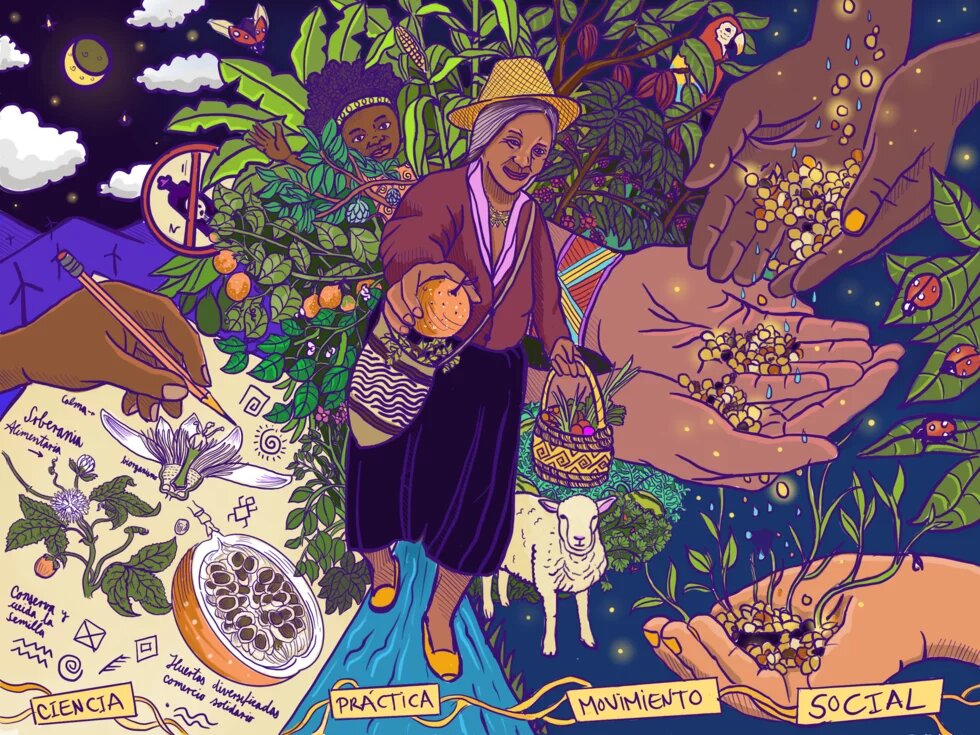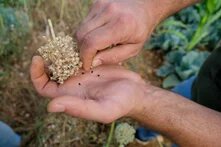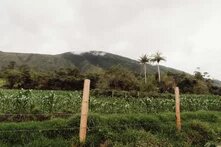The Corporación Ecologista y Feminista Penca de Sábila integrates feminism and agroecology as key strategies in the agroecological transition of peasant farms. Women in these settings face an overburden of care work and unequal access to resources. The organization developed an indicator that promotes women's equity, autonomy, and participation on the farms. This contributes to achieving sustainable agroecological systems.

Agroecology offers an alternative to the global food regime. Agroecology develops sustainable agroecosystems, fostering biological regeneration, productivity, and the diversification of plant and animal species. It also addresses the social, cultural, economic, and political situation of the communities that practice it, as being socially just is one of its core principles (Altieri and Toledo, 2010).
The agrarian and peasant movement embraced agroecology in the 1970s, resisting the Green Revolution. La Vía Campesina (LVC), the most internationally relevant agrarian movement, emerged in 1992, uniting 180 organizations from 81 countries. The Coordinadora Latinoamericana de Organizaciones del Campo (CLOC) formed in 1994 as a regional articulation linked to LVC (Saade, 2019).
CLOC-LVC women began highlighting the deep connection between capitalism, colonialism, and patriarchy. These systems work together to impose domination and control over land, common goods, and women's bodies. Based on this, they proposed popular peasant feminism and successfully incorporated it into their political organizing agenda.
Patriarchy is present in all social movements and political projects, and agroecology is no exception.
From this feminist perspective, peasant women successfully questioned gender relations in food production, commercialization, and consumption. They proposed alternatives for transforming these relations, shaping a feminist agroecology. Like Trevilla Espinal et al. (2020), this approach raises important questions: What arrangements exist for carework? How can we build just community alternatives where the sustainability of life becomes a collective responsibility?
Patriarchy is present in all social movements and political projects, and agroecology is no exception. Profoundly unequal gender relations in productive systems—stemming from the gender division of labor, in rural community settings, and in the commercialization of production—have been rarely questioned. Instead, they are often normalized and even invisible.
Feminist agroecology advocates for:
- Redistribution of domestic and care work within families.
- Recognition and remuneration of women's labor in productive systems.
- Economic autonomy and access to land for women producers.
- Equal participation in representative spaces and decision-making.
Feminism and agroecology are two extensive, complex, and historical struggles. They have increasingly interwoven in recent times, creating hopeful horizons for food sovereignty, land redistribution, common goods, democracy, and women's rights.
This frames the discussion on the possibility of a peasant life and economy outside of the capitalist and patriarchal vision. This economy goes beyond monetary exchanges and focuses on meeting community needs with social and gender justice, while recognizing human dependence on nature (Pérez Orozco, 2021).
The Indicator(s) to Transform Gender Relations
In Colombia, peasant farms are spaces for production, consumption, reproduction, and care, where traditions are maintained and inhabitants reproduce their lives. The line between life activities and the economy is often blurred (Vélez Vargas, 2017). On the farm, women take on domestic, care, and agricultural production work as an extension of care, without recognition or remuneration. This results in an overburden of labor that negatively impacts their physical and mental health, limits their time and autonomy, and reduces their ability to inhabit public space.
Within a system that already subordinates peasant life, men often hold power and authority over women because they dominate the economic resources generated by the farms (CLOC/LVC, 2024, p. 103). Questioning and transforming this situation can intensify violence. Therefore, peasant-based agroecology must incorporate and solidify actions against the inequality and violence women face. It must also contribute to closing gender gaps in rural areas.
Peasant-based agroecology must incorporate and solidify actions against the inequality and violence women face.
At the Corporación Ecologista y Feminista Penca de Sábila, we interweave feminism and agroecology to propose a transition that recognizes and helps transform the power relations on the farm. Our goal is to overcome the gender division of labor in the countryside and make women’s work visible (CLOC/LVC, 2024, p. 111).
In 2011, we collaborated with peasant and women's organizations in the Valle de Aburrá (Antioquia) to build an indicator for measuring the level of transformation of gender relations. This indicator has undergone several adjustments over time, with the latest revision conducted in 2023.
The indicator includes four key descriptors:
- Equitable participation of men and women in care work. This addresses two central questions: How do men and women participate in peasant farm productive systems? How do we discuss economic autonomy for peasant women without causing a labor overload? The objective is to center the sustainability of life and ensure that all humans assume this responsibility as interdependent and eco-dependent beings (González et al., 2019, p. 16).
- Equal participation in technical decision-making for production. This answers: How do we include women's voices in farm planning for the agroecological transition? This aims to strengthen their capacity to make agricultural management decisions and increase women’s participation in farm production activities.
- Women's autonomy in managing farm resources and benefits. The underlying question is: How do we promote women's direct access to markets, and their control and autonomous use of the farm's economic income and benefits to strengthen their economic autonomy?
- Participation in collective, community, or gender equity training spaces. This addresses two questions: How do we weave support networks for women to exercise and demand their rights? How do we strengthen women’s participation in collective territorial spaces, which men generally occupy? We seek women's articulation with women's organizations, productive and peasant organizations, and decision-making scenarios. This allows them to appropriate, exercise, and demand their rights.
How to Implement and Indicate Progress
This indicator is part of a battery of 10 indicators for the agroecological management of peasant farms. These indicators evaluate progress in:
- Ecological soil management.
- Ecological crop management.
- Seed custody.
- Incorporation of trees on the farm.
- Integration of the livestock component.
- Environmental management of the property.
- Record keeping.
- Self-consumption and commercialization.
- Peasant organization.
- Transformation of gender relations (Corporación Ecológica y Cultural Penca de Sábila, 2019).
This instrument has supported the agroecological transition of peasant farms in the Valle de Aburrá for over 14 years. It has contributed to consolidating the ColyFlor - Solidary Economic Circuit, which connects the agroecological production of about 100 small, city-edge peasant farms and 50 productive projects led by women.
This effort aims to commercialize approximately seven tons of food monthly (68% of sales contribute to women’s economic autonomy), strengthen peasant organization and fair trade, and promote responsible consumption.
A specific indicator focused on the "transformation of gender relations" within each peasant farm’s agroecological management system contributes to materializing feminist agroecology.
During 2024, the battery of indicators was presented as a proposal for inclusion in the Land Planning Instrument for Agroecological Transition (IPPTA), which is for national use, during citizen participation spaces for constructing the Public Policy on Agroecology and the National Agroecological Program. It was ultimately adopted and summarized into three indicators (Agencia de Desarrollo Rural, 2024). This instrument constitutes the national methodology for the agroecological transition of farms. All agricultural extension agencies – institutions responsible for providing technical assistance, training, and support to farmers and rural communities – will use it when applying the National Agroecological Plan.
Thus, this tool, which incorporates a feminist perspective, has scaled up to the national level and public institutions. It helps address the situation of agroecological women producers and trace specific actions to improve their living conditions and achieve greater equality in productive systems.
In conclusion, men holding power and authority over women stems from their dominance over the economic resources generated by peasant farms. We assume the challenge of questioning and transforming this situation. A specific indicator focused on the "transformation of gender relations" within each peasant farm’s agroecological management system contributes to materializing feminist agroecology, strengthening women’s economic, political, and social autonomy.
Spanish to English Translation: Santiago Aldana, Ecology & Sustainability Program Coordinator Heinrich Böll Foundation, Bogota Office
References
Agencia de Desarrollo Rural. (2024, 18 de octubre). Tutorial del Instrumento de Planificación Predial para la Transición Agroecológica - IPPTA [Video].
Altieri, M. y Toledo, V. M. (2010). La revolución agroecológica de América Latina: rescatar la naturaleza, asegurar la soberanía alimentaria y empoderar al campesino. El Otro Derecho, (42), 161-194.
CLOC/LVC. (2024). Feminismo campesino popular: acción y pensamiento de lucha de las mujeres del campo, indígenas y afrodescendientes de la CLOC/LVC.
Corporación Ecológica y Cultural Penca de Sábila. (2019). Indicadores para el manejo agroecológico de la finca campesina.
González, M., Pascual, M. y Herrero, Y. (2019). La vida en el centro: voces y relatos ecofeministas. Ecologistas en Acción.
Pérez Orozco, A. (2021). El conflicto capital-vida: aportes desde los feminismos. Revista Trabalho Necessário, 19(38), 1-24.
Saade, M. (Ed.). (2019). Elementos para la conceptualización de lo campesino en Colombia. Documento técnico. ICANH.
Trevilla Espinal, D. L., Estrada Lugo, E. J. y Soto Pinto, M. L. (2020). Agroecología y cuidados: reflexiones desde los feminismos de Abya Yala. Millcayac - Revista Digital de Ciencias Sociales, 7(13), 621-646.
Vélez Vargas, L. D. (2017). Adaptabilidad y persistencia de las formas de producción campesina (tesis doctoral). Universidad Nacional de Colombia, Medellín, Colombia.

